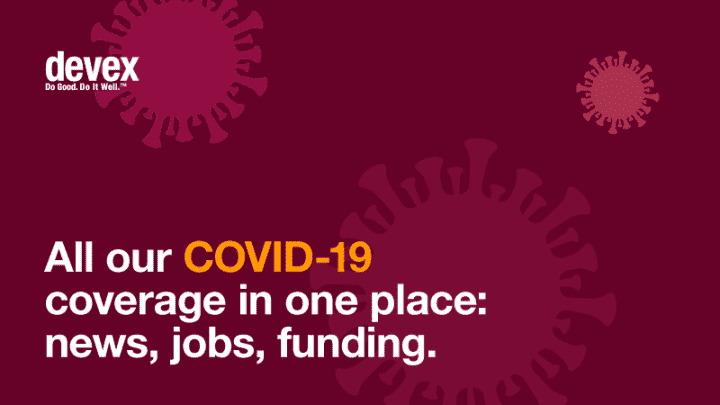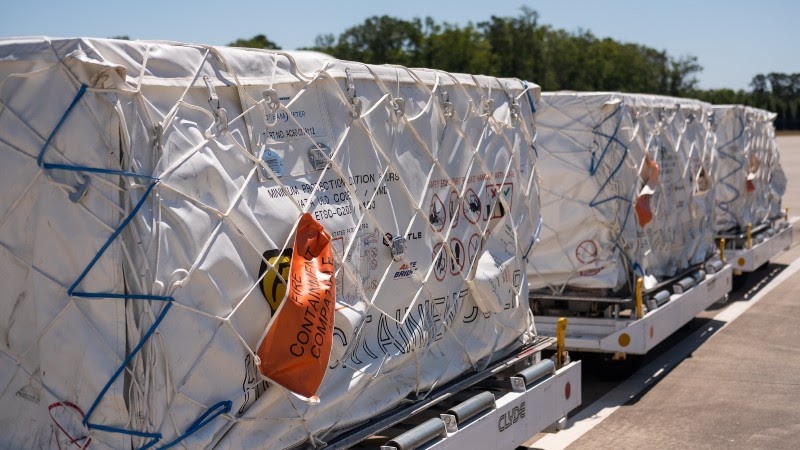
SAN FRANCISCO — The COVID-19 pandemic sparked panic buying around the world — and it wasn’t limited to consumers in grocery stores. Governments have scrambled to secure masks, protective gear, and ventilators, while also working to respond to supply chain disruptions challenging their health systems and other sectors.
We’ve lifted our paywall on all COVID-19 coverage.
Looking for more in-depth global development funding insights? Please consider supporting our journalism with a Pro subscription.
Panic buying from high-income countries, by governments that could afford the excessive markups in a seller’s market, made low- and middle-income countries particularly vulnerable.
The pandemic put procurement, where 1 in every 3 dollars of public money is spent, in the spotlight, said Gavin Hayman, executive director at the Open Contracting Partnership.
“We aren’t after a bit more transparency, we want a transformational change in the public marketplace,” he said. “We’ve probably advanced our case for reform of the risk-averse, slow-moving world of procurement three years in three months.”
“COVID became a catalyst for our efforts and showed how it is important to do timely improvements in all e-procurement systems.”
— Constantin Cearanovski, board member, Positive Initiative
The Open Contracting Partnership combines open government, with transparency mechanisms in place to allow for public oversight, and open data to transform the entire procurement process — from planning to tender to spending. Together with partners, it is seizing this moment to ensure that governments buy quickly and openly.
Prior to joining the Open Contracting Partnership, Hayman served as executive director at Global Witness, an NGO dedicated to investigating corruption. As he and his team searched for how money was stolen, public contracts were often at the center of the scandal.
“Procurement was this incredibly high-bound, risk-averse, paper-based process,” he said. “We are rethinking the whole approach, actually trying to measure what works then scale it up, rather than looking at a predominantly legalistic set of reforms where the law may change but the practices won’t change at all.”
Now, as procurement officials who typically meet in-person to evaluate bids are emailing documents back and forth due to the pandemic, advocates for procurement reform are pushing for more transformational change within their own countries, and sharing best practices across borders.
‘COVID became a catalyst for our efforts’
Hayman said Moldova was an example of a country where procurement reform efforts have come a long way in a short amount of time due to the pandemic.
Medical institutions in Moldova were temporarily allowed to bypass the government’s electronic procurement database. They could procure using direct contracting with no accountability and reporting mechanisms.
“We immediately noticed that was a huge threat to efficient spending of public money and public health,” said Constantin Cearanovski, a board member of Positive Initiative, a patients’ rights and advocacy group in Moldova.
Is COVID-19 magnifying colonial attitudes in global health?
As countries around the world struggle to contain the coronavirus, inequalities brought about by existing imbalanced power structures are resurfacing, resulting in growing calls to decolonize global health.
In a matter of weeks, Positive Initiative brought civil society organizations together with the ministry of health, and built a public platform displaying user friendly and regularly updated information on the government’s contracts to fight COVID-19.
Positive Initiative is one of five groups participating in Lift, Open Contracting Partnership’s impact accelerator program. When the advocacy group joined the accelerator last year, it sought to lower the price of HIV and tuberculosis medicine in Moldova. Now that citizens can see how money is spent on COVID-19 procurement, the benefits will extend beyond the pandemic to other health priorities.
“COVID became a catalyst for our efforts and showed how it is important to do timely improvements in all e-procurement systems,” Cearanovski said.
Get development’s most important headlines in your inbox every day.
Thanks for subscribing!
Over the past several months, Open Contracting Partnership has brought partners together on Zoom to share this story and other best practices to inform better planning, better buying, and better delivery and management of contracts, Hayman said.
For example, on May 28, the organization held a digital meeting with African partners to share key insights from their countries on ways to improve procurement.
While each country faces unique challenges, all of them could use support in spending limited resources wisely, not just during this emergency but after the pandemic, Hayman said.
The Public and Private Development Centre, an NGO focused on increasing citizen participation in Nigeria, is working closely with the government to track the country’s COVID-19 contracts. Open Contracting Partnership has provided “matchmaking opportunities for exchange of ideas within and outside the African region,” said Ifeoma Judith, who directs the center’s procurement governance program. She explained that her organization can also share lessons from Nigeria, including how to navigate gaps in technology, infrastructure, and capacity, and sustain political buy-in.
‘The costs of bad buying’
Hayman said COVID-19 has elevated the issue of procurement to the highest levels of government: “People are asking ‘Why don’t we know?’ for the first time,” he said. “The lack of a culture of measuring and seeing what works is suddenly noticed.”
This has put the individuals and organizations that Open Contracting Partnership works with in a strong position to make real change, he said.
For example, before the pandemic, Ecuador’s procurement agency had planned on upgrading its e-procurement system with the Open Contracting Data Standard, which allows users to disclose data and documents at every stage of the contracting process. The global health crisis accelerated its move toward open contracting, according to Wladimir Taco Lasso, technical operations lead for the Ecuadorean agency.
The agency created a tool that allows the public to monitor COVID-19 emergency procurement, so they can search for signs of corruption, raise their complaints, and hold the government to account.
“In emergencies, the role of a procurement agency takes special relevance, since the supply depends on it, to carry out any activity in response to the emergency,” Lasso said in an email to Devex.
He said the agency’s work with Open Contracting Partnership opened its eyes to what open data can achieve, gave the team access to the knowledge networks it needed to succeed, and provided examples of how the government and citizens can work together to increase efficiency in the use of public resources.
COVID-19 has made people aware of “the costs of bad buying,” Hayman said. “The costs of getting it wrong have been uniquely apparent,” he told Devex.
Hayman acknowledged the challenge moving forward is that “governments will probably forget the need for reforms as the world lifts the lockdown.”
“But then it is our job to remind them,” he said.

Printing articles to share with others is a breach of our terms and conditions and copyright policy. Please use the sharing options on the left side of the article. Devex Pro subscribers may share up to 10 articles per month using the Pro share tool ( ).


